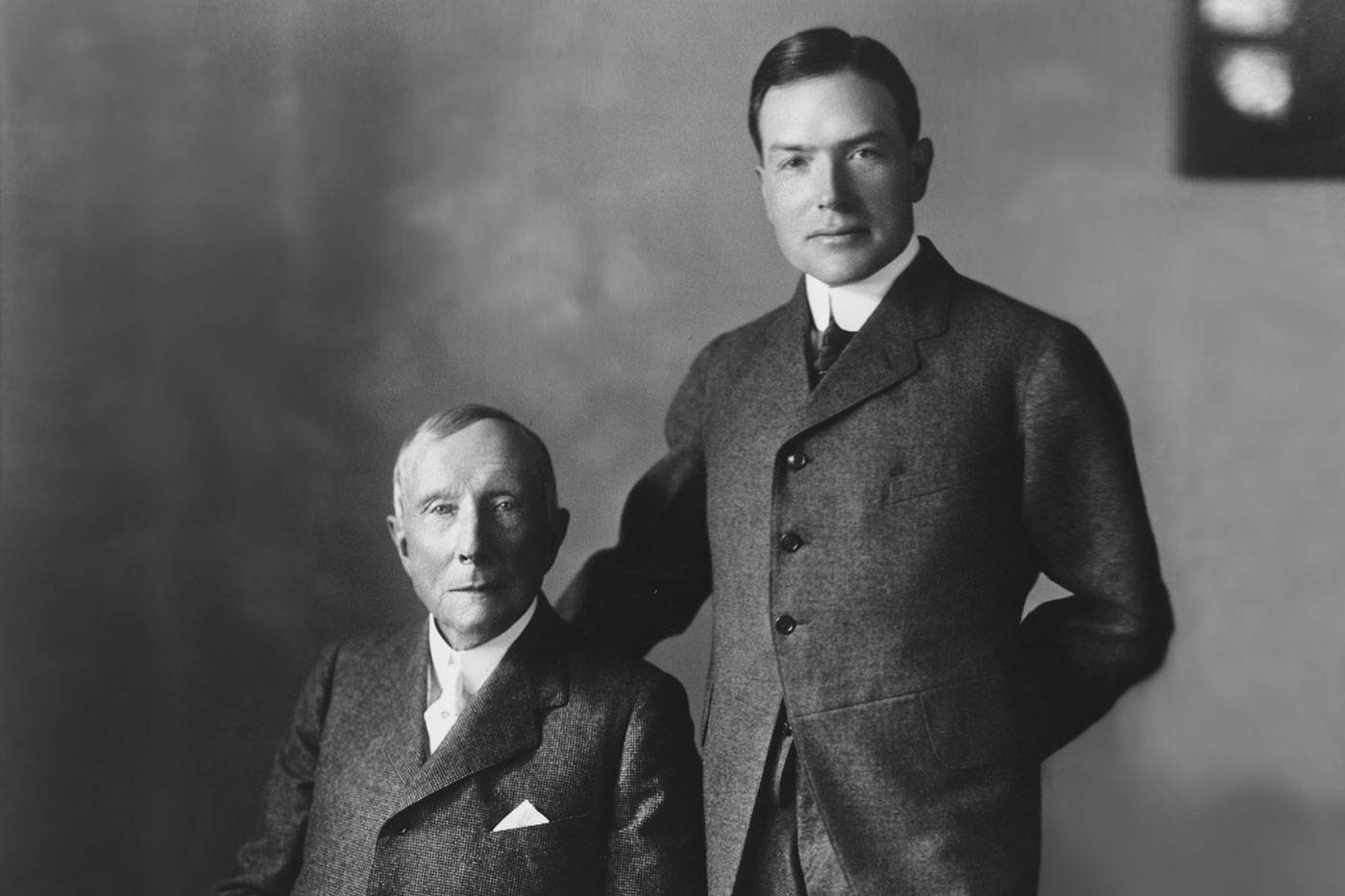Rockefeller Family: The Legacy Of Power, Wealth, And Influence
When you hear the name Rockefeller, it's hard not to think about money, influence, and history. The Rockefeller family is one of the most iconic names in American history, and their story is a perfect blend of wealth, power, and philanthropy. From Standard Oil to global charities, this family has left an indelible mark on the world. So, buckle up, because we're diving deep into the fascinating world of the Rockefellers!
The Rockefeller family is more than just a household name. They represent generations of success, innovation, and strategic thinking. Their legacy isn't just about money; it's about how they've used their resources to shape the world around them. Whether it's through business, politics, or charity, the Rockefellers have been at the forefront of change.
But what makes the Rockefellers so special? Is it their ability to stay relevant for over a century? Or is it their knack for reinventing themselves with every generation? Let's find out as we explore their rise, fall, and enduring influence. This isn't just a story; it's a lesson in how to build a legacy that lasts.
Table of Contents
- Biography of the Rockefeller Family
- The Early Days of the Rockefellers
- Standard Oil: The Foundation of Wealth
- Philanthropy and Charitable Contributions
- Rockefeller Influence in Politics and Society
- The Rockefellers in Modern Times
- Family Dynamics and Generational Wealth
- Controversies Surrounding the Rockefellers
- Global Impact of the Rockefeller Name
- The Enduring Legacy of the Rockefellers
Biography of the Rockefeller Family
The Rockefeller family is a dynasty that traces its roots back to John D. Rockefeller, the founder of Standard Oil and one of the richest men in history. But who exactly are they? To understand their impact, we first need to know a little about the family itself.
Family Overview
The Rockefellers started as a modest family in upstate New York. John D. Rockefeller, born in 1839, grew up in a household that valued hard work and education. His father, William Avery Rockefeller, was a traveling salesman, and his mother, Eliza Davison, instilled in him a strong sense of discipline and morality. These early influences would later shape his business philosophy.
By the late 19th century, John D. Rockefeller had transformed Standard Oil into a global powerhouse, making him one of the wealthiest individuals in history. But the family's story doesn't end there. Over the years, the Rockefellers have expanded their influence into various sectors, including finance, real estate, and philanthropy.
Family Data
| Name | Birth Date | Role |
|---|---|---|
| John D. Rockefeller | July 8, 1839 | Founder of Standard Oil |
| John D. Rockefeller Jr. | January 29, 1874 | Philanthropist and Businessman |
| David Rockefeller | June 12, 1915 | Banker and Philanthropist |
The Early Days of the Rockefellers
Before they became a household name, the Rockefellers were just another family trying to make ends meet. John D. Rockefeller's early life was filled with challenges, but it also taught him valuable lessons that would later shape his business approach.
Rockefeller's first job was as a bookkeeper, where he learned the importance of meticulous record-keeping. This attention to detail would become a hallmark of his business practices. By the age of 20, he had already started his own business, a partnership with Maurice B. Clark, which focused on produce commission.
It wasn't until 1863 that Rockefeller entered the oil industry, a decision that would change the course of history. He quickly realized the potential of oil as a lucrative business opportunity and invested heavily in refining operations. This move set the stage for the creation of Standard Oil.
Standard Oil: The Foundation of Wealth
Standard Oil wasn't just a company; it was a revolution in the oil industry. Founded in 1870, the company quickly dominated the market, controlling nearly 90% of U.S. oil refining by the early 20th century. But how did they achieve such dominance?
Innovative Business Practices
- Vertical Integration: Rockefeller bought out suppliers and distributors, ensuring complete control over the supply chain.
- Efficiency: By focusing on reducing costs and improving efficiency, Standard Oil offered cheaper oil products than its competitors.
- Monopolistic Tactics: Critics argue that Rockefeller engaged in predatory pricing and other anti-competitive practices to eliminate rivals.
Despite its success, Standard Oil faced intense scrutiny and legal challenges. In 1911, the company was broken up by the U.S. Supreme Court under the Sherman Antitrust Act. This decision marked the end of an era but solidified Rockefeller's legacy as a master strategist.
Philanthropy and Charitable Contributions
While the Rockefellers are known for their wealth, they're equally famous for their philanthropy. John D. Rockefeller Jr., in particular, played a pivotal role in shaping the family's charitable endeavors.
One of the most significant contributions was the establishment of the Rockefeller Foundation in 1913. The foundation focused on improving public health, education, and agriculture worldwide. Projects like the Green Revolution, which aimed to increase agricultural productivity in developing countries, are a testament to their commitment to global development.
Other notable initiatives include:
- Rockefeller University: A leading research institution focused on medical and scientific advancements.
- Rockefeller Center: A landmark in New York City that exemplifies the family's influence on urban development.
- Support for the arts: The Rockefellers have been major patrons of museums and cultural institutions.
Rockefeller Influence in Politics and Society
The Rockefellers' influence extends far beyond the business world. Members of the family have been involved in politics, serving in various capacities at both the state and federal levels.
One of the most prominent figures was Nelson Rockefeller, who served as Governor of New York and later as Vice President of the United States under President Gerald Ford. His policies focused on modernizing government and addressing social issues like poverty and education.
But the Rockefellers' impact isn't limited to politics. They've also been vocal advocates for social causes, including civil rights and environmental sustainability. Their ability to leverage wealth and connections has allowed them to effect change on a global scale.
The Rockefellers in Modern Times
Today, the Rockefeller family continues to thrive, adapting to the challenges of the 21st century. While their wealth may not be as concentrated as it once was, their influence remains strong.
Modern Rockefellers have diversified their interests, investing in technology, renewable energy, and other emerging industries. They've also continued their tradition of philanthropy, addressing pressing issues like climate change and global health.
David Rockefeller, the last surviving grandchild of John D. Rockefeller, passed away in 2017, marking the end of an era. However, the family's legacy lives on through the next generation, who are committed to preserving and expanding their ancestors' vision.
Family Dynamics and Generational Wealth
Managing generational wealth is no easy task, and the Rockefellers have faced their share of challenges. One of the biggest concerns has been maintaining unity within the family while navigating the complexities of modern finance.
To address these issues, the Rockefellers established the Rockefeller Family Office, which oversees their financial affairs and ensures that their assets are managed responsibly. This approach has helped them preserve their wealth while also supporting their charitable endeavors.
Family dynamics have also played a crucial role in shaping the Rockefellers' legacy. Their ability to work together and support one another has been key to their continued success.
Controversies Surrounding the Rockefellers
No story of power and wealth is complete without controversy, and the Rockefellers are no exception. Over the years, they've faced criticism for their business practices, political influence, and personal lives.
One of the most significant controversies was the dissolution of Standard Oil, which many saw as a necessary step to restore competition in the oil industry. Others have accused the family of using their wealth to exert undue influence on politics and public policy.
Despite these challenges, the Rockefellers have remained resilient, using their platform to address criticisms and demonstrate their commitment to ethical leadership.
Global Impact of the Rockefeller Name
The Rockefellers' influence extends far beyond the borders of the United States. Their charitable work has touched millions of lives around the world, from funding medical research to supporting educational initiatives.
Through organizations like the Rockefeller Foundation and the Asia Society, the family has played a key role in promoting international cooperation and understanding. Their efforts have helped bridge cultural and economic divides, fostering a more interconnected world.
But the Rockefellers' impact isn't just about money; it's about ideas. They've championed causes like sustainable development and social justice, inspiring others to take action and make a difference.
The Enduring Legacy of the Rockefellers
As we look back on the history of the Rockefeller family, it's clear that their legacy is one of innovation, resilience, and generosity. From their humble beginnings in upstate New York to their current status as global influencers, the Rockefellers have shown us what's possible when vision meets determination.
So, what can we learn from their story? First, that success isn't just about making money; it's about using your resources to create positive change. Second, that family unity and shared values are essential for long-term success. And finally, that even the most powerful families aren't immune to challenges, but how they respond defines their legacy.
I encourage you to share this article with others who might be interested in the Rockefeller family's story. And if you have any thoughts or questions, feel free to leave a comment below. Together, let's continue the conversation about how we can build legacies that last!


